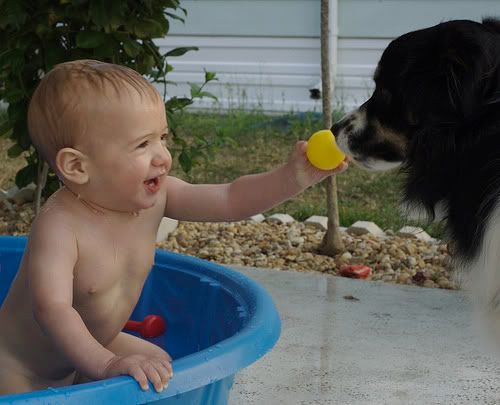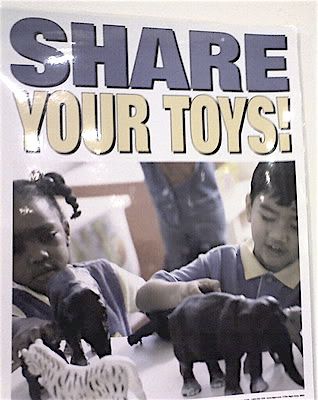
The downside to having watched the Baby Signing Time DVDs is that we've learned a couple signs that I don't know what to do with.
The two signs in contention are "nice" and "share" (the first half of this sign).
Don't get me wrong — these are helpful, positive words. When used helpfully and positively. Whereas often they're used to shame and coerce and deny.
For instance, here are some alternate uses of the words in question:
• "You love your daddy, don't you? He's so nice!" (I will actually say this when Mikko gets excited that his father is coming toward him.)
• "Wanna share an entree?" (Sam and I share meals all the time when we're eating out.)
• "Share the truck with your friend. No, don't hit! Be nice!"
Can you see that the last one is not actually about sharing or niceness? It's about enforcing certain behaviors, without the emotional context that should exist behind them. Mikko can call his dad nice, because Sam acts nicely toward Mikko, so when I call Sam "nice," I'm not trying in any way to engineer Sam's behavior toward Mikko or Mikko's response to Sam. I'm simply stating a fact. When Sam and I share a meal, it's because we've both chosen to, because we like the variety that comes in sharing a couple dishes or the cost savings if we're not hungry enough to eat a whole meal individually.
So, we were out the other night, meeting with some friends at the mall food court, and had a drink that Mikko was commandeering. He does this all the time now, to the point that we've stopped asking when we'll have to buy him his own meal when we eat out to when we'll have to buy him his own drink. When we're home, he wants whatever we're drinking, signing "water" (his new favorite sign) to mean drink: actual water, juice, milk, soda, coffee for heaven's sake. I've drawn the line at margaritas! I'm a diet soda fiend, but I'm reluctantly considering switching to all water all the time when Mikko's awake, so that he doesn't become similarly attached. (NB: I hate drinking water. It makes me thirsty. No, seriously.)
Well, the drink we had that night was a smoothie, and Sam and I were very thirsty. Not to say that Mikko wasn't as well, but at least he had nummies as an additional (free) option. He held onto it, intently signing "water" whenever we'd wrest it out of his grip for our own sips. I finally said and signed to him, "Are you going to share with Daddy? Let Daddy have a turn." And then I immediately felt weird about it.
In some sense, this was simple fact: We were all three sharing the drink, although Sam and I had chosen to, and Mikko was now being forced into the scenario. So, in the other sense, it seemed a little manipulative, like, Let me tell you what sharing means for you as a kid: It means you don't get what you want.
That's what irks me about using the words "share" and "nice," as well as praise like "good boy" — it's not that they're wrong in themselves, but it's how they've been appropriated by our culture. If I emphasize the word "share" with Mikko, even in its best
 sense, it's with the understanding that he'll hear it out in the wider culture from other grownups and children to mean something different, something less. "Nice" and "good," for instance, generally mean, "whatever is convenient for grownups." So, for instance, a child isn't good just for who he is inherently — he's good because he picked up all his toys, or because he kept quiet during the movie (neither of which Mikko can achieve, and yet I still think he's a good kid!).
sense, it's with the understanding that he'll hear it out in the wider culture from other grownups and children to mean something different, something less. "Nice" and "good," for instance, generally mean, "whatever is convenient for grownups." So, for instance, a child isn't good just for who he is inherently — he's good because he picked up all his toys, or because he kept quiet during the movie (neither of which Mikko can achieve, and yet I still think he's a good kid!).It's an issue that worries me about school, too. Ever since Mikko started attending preschool, I've been faced with the consequence that he's rubbing against language and values with which he wouldn't have come into as extended contact if we'd kept him solely at home with us. I see the benefits of his attending this part-time school, but it has been hard to watch something as seemingly innocent as his new technique of clapping for himself and saying "Yea" every time he completes a task. This wasn't something we'd shown him, so I can only imagine it came from preschool. I don't have a problem with it if it's Mikko's genuine enthusiasm expressing itself, and for now I think it is, but it worries me that it could eventually be used coercively against him, in a behavioral training sort of way — as in, Do what we tell you and we'll clap and cheer for you when you've done it.
Mikko's so good at sharing right now genuinely. He offers toys and pens and food to everyone around him. He wants to share because he sees us doing it (he started feeding us because we would often pop bites into his mouth) and because he wants to connect with the people he cares about, and maybe because he wants to give others a taste of the pleasure he's discovered. I don't want to associate that wholehearted, natural sharing with some narrow definition of "You really want this, but you can't have it right now." I want to preserve that innocent goodness as long as possible.
For now, I'm going to just try to police myself and use these loaded words and signs in the contexts that I think are, well, the nicest.
Photos courtesy ChroeZoe on flickr (cc)
and andycarvin on flickr (cc), respectively
and andycarvin on flickr (cc), respectively









 I'm Lauren Wayne, writer and natural parent. I embrace attached parenting with an emphasis toward green living.
I'm Lauren Wayne, writer and natural parent. I embrace attached parenting with an emphasis toward green living. 


2 comments:
Great post, and good reminder. I work in the nursery at church and I have no idea what I should do in regards to "sharing." If a child takes a toy away from another, I usually don't say anything, unless the other child gets really upset. I'll ask the toy-swiper to return it, but if they don't want to, I don't push it. I feel pressured to intervene because the other nursery workers do. I am feeling a little conflicted about praising the children, though I try to water it down--for example, "You guys are being so reverent! You listened so well! You walked so quietly!" so they can learn that their behavior is desirable but without making them feel like they have to do it in order to be accepted.
With my son (10mo), I try to intervene as little as possible and try to set a good example for him. It bugged me last night when his grandma praised him so enthusiastically for performing a new skill he has been working on.
I think that when a child is exposed to behavioral training, it is going to affect him in the areas where he learned the training. For example, I won't be surprised if my son starts doing things just to impress grandma and get that praise and attention from her. But I wouldn't expect him to do that for me.
That's a good example. I usually want to back off and let the toy swiping get worked out by the kids, too, but then you're always wondering what the other parents are thinking. I remember one Sunday in the cry room at our church, my son kept stealing toys from another kid, and the father kept saying to his son when he'd try to get them back, "No, no, you need to share!" I almost laughed at how backward it was, but I was at a loss of how to respond. Was I expected to reprimand my son and return the toy? Or was I expected to honor the father's commitment to teaching his son "sharing"?
I like your thought that they might learn different behavior for different people. We definitely have some "good boy/good job" for everything type of friends, but I figure Mikko's around us much more than he's around them, so it should all balance more our way, don't you think?
Post a Comment